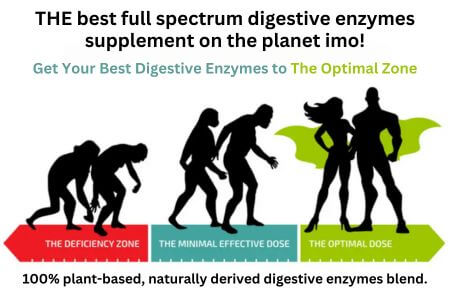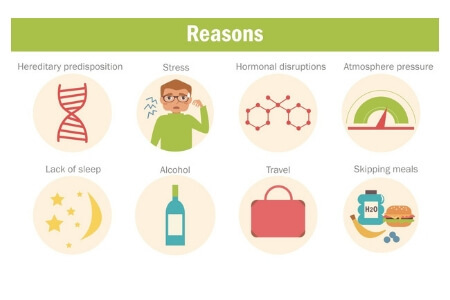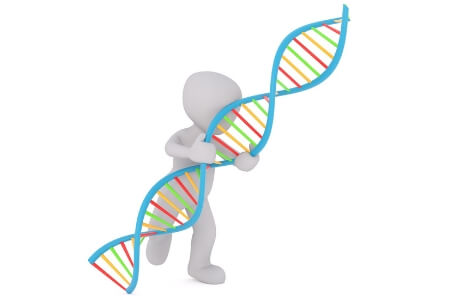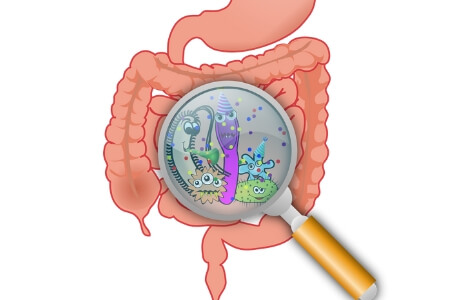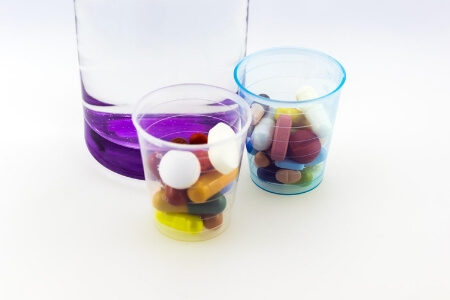Digestion Problems and Migraine: Is Your Gut Behind Your Headaches?
Are digestion problems contributing to your migraine attacks? Many people living with migraine also struggle with bloating, constipation, IBS, delayed digestion, or unexplained stomach discomfort. Increasingly, research shows that digestive issues and migraine may be more closely connected than we once thought.
 Digestive symptoms and migraine may be connected through the gut–brain axis, where gut bacteria and digestion influence neurological signaling
Digestive symptoms and migraine may be connected through the gut–brain axis, where gut bacteria and digestion influence neurological signalingThe gut and brain communicate constantly through what is known as the gut-brain axis. When digestion is disrupted, inflammation, neurotransmitter imbalance, and altered nerve signaling can all influence migraine activity.
Let’s break down how digestion problems may affect migraine, and what you can do about it.
How Digestion Problems Affect Migraine Attacks
Migraine is not just a head pain disorder. It is a complex neurological condition involving inflammatory signaling, neurotransmitters, and vascular changes. Your digestive system plays a role in all of this.
The gut and brain communicate bidirectionally through the Vagus nerve, immune pathways, and circulating inflammatory markers. Two key players in this communication are serotonin and CGRP (calcitonin gene-related peptide), both heavily involved in migraine.
Gut-Brain Communication
Serotonin
Known as the “feel-good” neurotransmitter, about 90% of serotonin is produced in the gut, where it regulates digestion. Low serotonin levels, associated with both mood disorders and migraines, can contribute to digestive disturbances like nausea and vomiting during migraine attacks. [2]
CGRP and Inflammation
CGRP is a neuropeptide involved in migraine attacks. High levels of CGRP in the gut can slow digestion and trigger inflammation, often leading to nausea or pain. Inflammatory responses in the gut may travel via the bloodstream to the brain, worsening migraine symptoms. [1]
The Basics of Digestion
Digestion is a very complex area, so I will just keep it all as simply as I can. Digestion actually begins in the mouth.
There are 2 digestive system function processes that take place
in our body - mechanical digestion and chemical digestion. The mouth
is where the mechanical digestion process starts.
Your saliva in your mouth provides ptyalin to soften the food and enzymes to break down the food as the teeth grind or ‘masticate’ the food. So, the teeth break the food down into small pieces and this enables the chemicals required to start digestion. The tongue muscle then helps to form a ball and squeeze it down the throat.
The ball of food goes down the esophagus and into the stomach – this is still part of the mechanical process. The stomach is where the food is broken down further with chemicals and enzymes enabling a separation between nutrients to be taken into the body and waste products to be eliminated.
Our digestion plays such an important role
for our body’s well being. The nutrients that get to the blood in our body are
directly determined by what we put in our mouths. Nutrient deficiency
is already known to be high in people living with migraine.
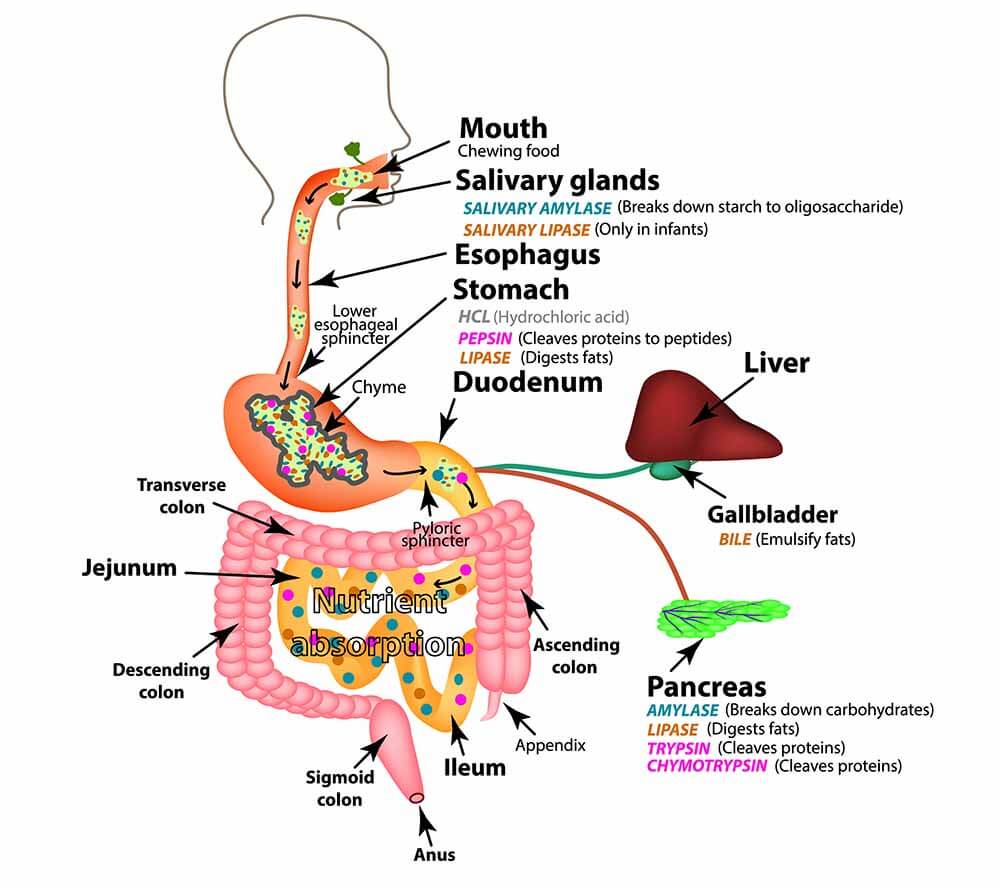 Understanding the digestive system helps explain how digestion problems can impact migraine
Understanding the digestive system helps explain how digestion problems can impact migraineCommon Digestive Disorders Linked to Migraine
Several digestion problems appear more frequently in people living with migraine.
Gastroparesis
Delayed gastric emptying is common in people with migraine disorder, making it harder for the stomach to move food through the digestive tract during an attack. When the stomach slows down, oral medications may not absorb effectively. This is one reason some people benefit from nasal sprays or injectable treatments during severe attacks.
Irritable Bowel Syndrome (IBS)
IBS is a common comorbidity with migraine. Shared triggers such as stress, serotonin imbalance, and inflammation may explain this overlap. Increased gut permeability and low-grade inflammation seen in IBS may also contribute to migraine susceptibility.
Bloating, Constipation, and Diarrhea
These symptoms may signal underlying gut imbalance. Constipation, in particular, is frequently reported alongside migraine. You can read more in Does Constipation Cause Migraine Headaches.
Nutrient Deficiencies
Poor digestion reduces absorption of critical nutrients such as magnesium, B vitamins, and omega-3 fatty acids. Low magnesium levels, for example, are associated with increased migraine frequency.
If magnesium is part of your pattern, see Which Magnesium Is Best for Migraines to understand the most effective forms.
Microbiome Imbalance
Imbalances in gut bacteria can contribute to inflammation, which can increase migraine susceptibility. Probiotics and prebiotics are promising options if you're seeking to improve both gut health and migraine symptoms.
Step-by-Step Plan to Improve Digestion Problems and Support Migraine Reduction
Improving digestion does not require a complete overhaul overnight. Start with foundational habits and build gradually.
Step 1: Hydration and Fiber
Hydration supports circulation, nutrient absorption, and bowel regularity. Aim for at least 8 glasses of water per day and consistent daily intake rather than large amounts at once.
Increase fiber gradually by adding whole grains, leafy greens, and fiber-rich fruits like kiwi, apples and berries. Avoid overdoing it with fiber, as sudden increases can cause gas and bloating.
For structured hydration guidance, see How to Get Proper Hydration for Your Body.
Step 2: Mindful Eating
Digestion begins in the mouth. Chewing thoroughly allows enzymes in saliva to begin breaking down food properly. Eating slowly reduces bloating and digestive stress.
Set aside time for meals, focus on each bite, and aim to chew each mouthful thoroughly before swallowing. Avoid multitasking while eating. Let your body focus on digestion.
Step 3: Anti-Inflammatory Nutrition
Chronic inflammation can worsen both digestion problems and migraine. Anti-inflammatory foods can reduce both gut and systemic inflammation, which may help decrease migraine frequency. Foods rich in omega-3 fatty acids, for instance, can reduce inflammation markers that might otherwise trigger migraines.
Focus on:
- Omega-3 rich foods such as salmon and flaxseed
- Leafy greens, turmeric, and nuts
- Whole foods over processed options
Limit, or avoid, common triggers such as excessive caffeine, alcohol, refined sugars, and artificial sweeteners.
Step 4: Support the Microbiome
Probiotics can help maintain a healthy balance of gut bacteria, which supports digestion and may reduce gut inflammation that could contribute to migraine susceptibility.
Start with a high-quality probiotic supplement or add probiotic-rich foods like yogurt, kefir, sauerkraut, and fermented vegetables. Introduce slowly to avoid temporary bloating.
Step 5: Consider Digestive Enzyme Support
Some individuals with digestion problems may benefit from digestive enzyme supplementation, particularly if low stomach acid or protein digestion issues are suspected.
I personally use MassZymes by BiOptimizers because it combines multiple digestive enzymes in one formula and has worked well for me. If you are exploring enzyme support, this is the formulation I trust.
As always, consult your healthcare provider before adding digestive supplements.

 Healthy digestion supports nutrient absorption and migraine prevention
Healthy digestion supports nutrient absorption and migraine preventionDigestive Enzymes and Digestion Problems
Digestive enzymes assist in breaking down proteins, fats, and carbohydrates. In people with impaired digestion, incomplete breakdown of food may contribute to bloating, gas, and inflammation.
Common enzyme ingredients include:
- Betaine HCL - aids in stomach acid production, essential for protein digestion.
- Protease - breaks down proteins, preventing undigested food from becoming a migraine trigger.
- Lipase - essential for fat digestion, reducing bloating and gas.
- Amylase - breaks down carbohydrates, easing digestion of starchy foods.
- Papain and Bromelain - plant-based enzymes that support protein digestion and have anti-inflammatory effects. [6+7]
These formulations vary significantly, and not all are appropriate for everyone. Professional guidance is recommended if symptoms are persistent.
I personally use MassZymes by BiOptimizers because it combines multiple digestive enzymes in one formula. If you are exploring enzyme support, this is the formulation I trust.
Additional Strategies to Reduce Digestion Problems and Migraine
Addressing digestive issues can alleviate some migraine symptoms. Here are a few strategies:
Follow a High-Fiber, Low-FODMAP Diet
Fiber supports gut health, while a low-FODMAP diet reduces fermentable sugars, which can cause bloating and gas. A high-fiber diet, particularly when combined with probiotics, has been shown to balance gut bacteria and lower inflammation. [3+6]
Avoid Common Triggers
Foods that often cause digestive issues for migraine sufferers include processed foods, artificial sweeteners, caffeine, and foods high in refined sugars. Eating slowly and avoiding overeating can also prevent digestive overload.
Rest and Digest
While staying hydrated helps prevent both migraine headaches and digestive issues, rest and stress management are also critical. Stress increases cortisol, which disrupts both gut health and the neurochemical balance affecting migraine. [3]
Establish Consistent Mealtimes
Sticking to a regular eating schedule can help regulate your body’s digestive rhythm and prevent the discomfort that may trigger an attack. Plan your meals and snacks at the same times each day to support your digestive health and overall well-being. A migraine brain loves routine.
When to Seek Medical Advice
Seek medical evaluation if you experience:
- Persistent abdominal pain
- Unexplained weight loss
- Severe constipation or diarrhea
- Difficulty swallowing
- Blood in stool
Digestive disorders such as inflammatory bowel disease, celiac disease, or significant motility disorders require professional care.
Final Thoughts
Digestion problems and migraine are closely intertwined through the gut-brain axis. Supporting your digestive system may reduce inflammation, improve nutrient absorption, and stabilize neurological pathways involved in migraine.
Addressing gut health is not about chasing a trend. It is about strengthening one of the body’s most important regulatory systems.
Work gradually, track your patterns, and consult your healthcare provider for personalized guidance.
If digestion problems are part of your migraine pattern, improving gut health may be one of the most practical long-term strategies you can implement.
Ready to take the next step?
Choose the next step that fits where you are right now.
MIGRAINE CAUSES Related Articles
Digestion Problems and Migraine References:
1. Mayo Clinic. Migraines and gastrointestinal problems: Is there a link? Available [online] at: https://www.mayoclinic.org/diseases-conditions/migraine-headache/expert-answers/migraines/faq-20058268
2. The Journal of Headache and Pain. Gut-brain Axis and migraine headache: a comprehensive review. Available [online] at: https://thejournalofheadacheandpain.biomedcentral.com/articles/10.1186/s10194-020-1078-9
3. American Headache Society. Research Summary: Link Between Gastrointestinal Disorders and Migraine. Available [online] at: https://americanheadachesociety.org/research/library/research-summary-a-link-between-gastrointestinal-disorders-and-migraine-insights-into-the-gut-brain-connection
